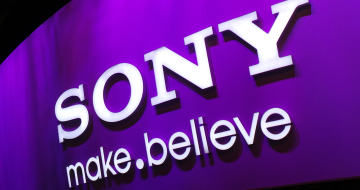 A British youth has been arrested over the hack that brought down the Playstation network and Xbox Live over the holiday period.
A British youth has been arrested over the hack that brought down the Playstation network and Xbox Live over the holiday period.
 A British youth has been arrested over the hack that brought down the Playstation network and Xbox Live over the holiday period.
A British youth has been arrested over the hack that brought down the Playstation network and Xbox Live over the holiday period.
 Despite a storm in a teacup over the Sony hack, which saw high level political involvement, Sony insists that there will be no financial fallout for the company.
Despite a storm in a teacup over the Sony hack, which saw high level political involvement, Sony insists that there will be no financial fallout for the company.
Sony Chief Executive Kazuo Hirai said he does not expect the November cyber attack on the company’s film studio to have a significant financial impact.
Apparently the film which North Korea wanted blocked “The Interview,” has generated revenue of $36 million. It earned another $5 million at 580 independent theatres showing the movie in North America.
The flick cost $44 million to make but given that it was a rubbish film, Sony probably was relieved that hack meant that it did not have to spend much marketing it. Most of the sales have been online. It will probably make a little more when it goes to DVD and Sony will get its cash back on a film that it otherwise probably would not have. Some have said that Sony spent $30 million marketing the flick which would mean that the film would come in at a loss.
“We are still reviewing the effects of the cyber-attack,” Hirai told reporters. “However, I do not see it as something that will cause a material upheaval on Sony Pictures business operations, basically, in terms of results for the current fiscal year.”
Sony Pictures may need several more weeks to rebuild its computer network after what has been deemed as the most destructive cyber-attack on a company on US soil. North Korea has denied it is behind it.
 Sony has been sending out legal notices to those publishing its leaked e-mails.
Sony has been sending out legal notices to those publishing its leaked e-mails.
Over the holidays Sony threatened Twitter with legal action if they allow users to publish the leaked e-mails Sony calls “stolen”.
A DMCA notice was sent to Twitter demanding that the tweets be taken down because the e-mails were copyrighted. Twitter so far has not done anything about the tweets.
Online media outlets and blogs such as Buzzfeed and Torrentfreak have been publishing leaked information too, and it is possible that Sony is testing the legal waters of stopping the spread of embarrassing information by going after a soft target.
Of course, that has not worked and Twitter has kept the accounts of its users up and running.
It is a moot point if Sony will stop any more embarrassing details from the hack coming to light. After all the US Government could not stop embarrassing information being leaked online via Wikileaks and other news sites.
 Tawian’s watchdogs have cleared China’s Xiaomi and other smartphone brands of breaching data protection laws after national security concerns triggered a government probe.
Tawian’s watchdogs have cleared China’s Xiaomi and other smartphone brands of breaching data protection laws after national security concerns triggered a government probe.
The National Communications Commission said all the 12 brands it had tested, which also included handsets sold by Apple, Samsung, LG and Sony , did not violate the laws.
James Lou, an NCC official who was involved in the testing, said the commission, however, would request mobile phone makers make information transmission more secure.
The probe was started over concerns that the Chinese handset makers Huawei and ZTE were being used as snooping tools by the Chinese.
Taiwan is a bit sensitive to security matters involving China, which is its largest trading partner, but has never renounced the use of force to take back what it deems a renegade province.
Xiaomi, whose budget smartphones are popular throughout Asia, was previously accused of breaching data privacy. In August, the company said sorry and changed a default feature after a Finnish security company said Xiaomi collected address book data without users’ permission.
Taiwan’s government began performing independent tests on Xiaomi phones after media reports said that some models automatically send user data back to the firm’s servers in mainland China.
The probe was then widened to include local and foreign handsets. The NCC report said handsets made by HTC Corp, Asustek, Far EasTone, Taiwan Mobile and InFocus Corp, whose handsets are made by Taiwan’s Hon Hai Precision Industry were also cleared of breaching the data protection laws.
 A report from Flurry indicated that Apple seriously outdid its competitors over the Christmas period.
A report from Flurry indicated that Apple seriously outdid its competitors over the Christmas period.
The metrics company said that of all the devices activated in the week up to Christmas Day, Apple ruled the roost with 51 percent of device activations.
Samsung devices took second place with 17.7 percent of activations, Nokia took 5.8 percent, Sony took 1.6 percent and LG managed a measly 1.4 percent.
Microsoft owns Nokia now so it could be said to be third in the pecking order.
Flurry Analytics said the figures indicated that the introduction of Apple’s iPhone 6 and iPhone 6 Plus had a “blockbuster” holiday season, beating the somewhat dismal gizmo trend.
Flurry also said that the largest number of app installs on Christmas Day, with 2.5 times the installs compared to any day in the previous three weeks.
The company also managed to track the type of device, with full size tablets taking 16 percent, small tablets 17 percent, “phablets” three percent, medium phones 58 percent and smalll phones seven percent.
 For years Hollywood has been claiming that it has made giant settlement figures with those it considered pirates, to use fear to drag the IT industry into doing its bidding.
For years Hollywood has been claiming that it has made giant settlement figures with those it considered pirates, to use fear to drag the IT industry into doing its bidding.
But now, thanks to the Sony hack, those figures are being questioned.
At the end of 2013, Hollywood claimed it managed to get IsoHunt to ‘pay’ $110 million and Hotfile agreeing to ‘pay’ $80 million. In both cases, we noted that there was no chance that those sums would ever get paid.
TorrentFreak has been combing through the Sony emails and found that the Hotfile settlement was really just for $4 million, and the $80 million was just a bogus number agreed to for the sake of a press release that the MPAA could use to scare others.
“The studios and Hotfile have reached agreement on settlement, a week before trial was to start. Hotfile has agreed to pay us $4 million, and has entered into a stipulation to have an $80 million judgment entered and the website shut down,” the email from Sony’s SVP Legal reads.
The $4 million was paid out, in three separate payments, but Hollywood would have lost a fortune bringing the case.
It is also unlikely that any of the $4 million went back to any content creators, it would have been used to fund MPAA’s vast “anti-piracy” machine, allowing it to be used for other lawsuits and funding investigations by state Attorneys General.
It makes you wonder if anything they say involving money has any shred of truth.
 North Korea experienced a complete unternet outage for hours before links were restored this morning.
North Korea experienced a complete unternet outage for hours before links were restored this morning.
At the moment it is unclear what caused the country’s internet to go dark – it could have been a technological glitch or a hacking attack. The US government denied that it was involved in any cyber action against Pyongyang in revenge for attacking its paymasters in Hollywood recently.
US President Barack Obama had vowed to respond to the major cyber-attack on Sony, which he blamed on North Korea, “in a place and time and manner that we choose”,
North Korea’s internet links were unstable on Monday and the country later went completely offline.
South Korea, which remains technically at war with the North, also had a motive. It recently revealed that a nuclear power plant operator had been hacked, probably by North Korea.
South Korean President Park Geun-hye said the leak of data from the nuclear operator was a “grave situation” that was unacceptable as a matter of national security, but she did not mention any involvement of North Korea.
Most North Korean’s would have been unaware that the internet was broken. Very few of its 24 million people have access.
Almost all its Internet links and traffic pass through China. North Korea is dependent on a single international provider, China Unicom.
Apparently the United States asked China to shut down servers and routers used by North Korea that run through Chinese networks. It also asked them to identify any North Korean hackers operating in China and, if found, send them back to North Korea. It wants China to send a strong message to Pyongyang that such acts will not be tolerated.
If the Chinese had switched off the internet for a few hours to send a message to North Korea they did not tell anyone about it.
In Beijing, the Chinese Foreign Ministry said while it opposed all forms of cyberattacks and that there was no proof that North Korea was responsible for the Sony hacking.
 Tin box shifter, Michael Dell is doing rather well in the growing Indian server market according to beancounters at IDC.
Tin box shifter, Michael Dell is doing rather well in the growing Indian server market according to beancounters at IDC.
The analyst firm claims that Dell India has become the largest server player in the India market, doubling its shipments in the third quarter and commanding 38 percent market share in terms of revenue.
While the other players saw a decline in server shipments in the third quarter, Dell shipments more than doubled largely due to investments by the Retail industry.
HP, market leader in terms of overall shipments, saw a decline of 12 percent, while IBM’s market share dropped by about five percent. Dell grew by 17 percent in terms of overall shipment units, coming close second to HP, with about 29 percent market share.
“The non x86 server market saw a decline of 58 percent in terms of revenue in Q3 2014 as compared to Q3 2013 due to large refreshes in verticals like Banking and telecom being on hold due to various factors,” IDC said.
Dell India has been growing in the server as well as PC market as it completely revamped its go-to-market strategy in India after its privatisation.
It is now trying to offer integrated systems to enterprises as it attempts to fill in a void created by IBM’s exit from commoditised x86 server business, which is not only helping it expand its market but also get higher value deals.
 After Sony refused to release “The Interview” because of pressure from a hacker group, it seems Anonymous is furious.
After Sony refused to release “The Interview” because of pressure from a hacker group, it seems Anonymous is furious.
The hacker group has decided that since Sony is bowing to the will of hackers to pull the film, it will release it, itself.
Of course Sony is not happy about this, which Anonymous will be pleased about, but the question is why would one hacker collective rain on another’s parade.
Part of this appears to be because Anonymous does not think that “Guardians of Peace” who managed the Sony raid are true hackers. They believe that the hacker group is a tool of the North Korean government.
Hackivism is one thing, but when you are hacking on behalf of a government you have broken the rules. But according to the tweets, Anonymous is cross that Sony caved in so easily to the GoP demands and banned the film.
“Okay, for real though. @SonyPictures is a little bitch for giving in so easily. Then again, what do you expect from Sony other than that?”
“You’re gonna let Kim Junk Uno and his minions boss you, a multimillion dollar corporation responsible for billions of dollars in revenue?”
Anonymous claims that it infiltrated Sony’s systems long before North Korea and it was going to release the film “as a Christmas present.”
“We’re not with either side, we just want to watch the movie too…and soon you too will be joining us,” the group tweeted.
 When it comes to winning a war which does not involve flinging bullets at the enemy, flying high tech-drones, or cruise missiles, it seems that the US is hopeless.
When it comes to winning a war which does not involve flinging bullets at the enemy, flying high tech-drones, or cruise missiles, it seems that the US is hopeless.
After the FBI identified that the Sony hack was caused by North Korean cyber warriors who were miffed about a comedy film which involved North Korean leader Kim Jong-un, Sony immediately surrendered and pulled the flick “The Interview” from distribution.
This followed the fact that five theatre circuits in North America have decided not to play Sony’s The Interview.
Regal Entertainment, AMC Entertainment, Cinemark, Carmike Cinemas and Cineplex Entertainment have all decided against showing the film.
“Due to the wavering support of the film The Interview by Sony Pictures, as well as the ambiguous nature of any real or perceived security threats, Regal Entertainment Group has decided to delay the opening of the film in our theatres,” Regal said.
Cinemark also confirmed Wednesday that the chain had determined that they would not exhibit the film “at this time.” In addition, Cineplex, which is based in Canada, said it had decided to “postpone” the movie, with a spokesman saying, “Cineplex takes seriously its commitment to the freedom of artistic expression, but we want to reassure our guests and staff that their safety and security is our number one priority.”
It seems that the hackers managed what Kim Jong-un’s rocket threats, and artillery shelling could not – the complete surrender of US forces.
Sony had refused to back down from its plans to release the film, starring Seth Rogen and James Franco, on December 25. Instead, in discussions with exhibitors, it told the exhibitors it was up to them whether or not they played the movie and that Sony would support whatever decision they made.
However, clearly, the distributors were terrified of the North Koreans and any stiff upper lip was above a loose flabby chin.
What this means, of course, is that Kim’s Cyber Warriors will be back. After all, if you have a weapon which can bring the United States to its knees that easily, you will use it. Sony would have been better off running the film and telling everyone it was a matter of patriotic pride to show North Korea who really was boss. Apparently running screaming like a four year-old girl from a guy in a clown mask is US defence policy now – clearly following the role model given by the French who helped found the country.
 The Sony hacking has revealed that Snapchat, and its CEO Evan Spiegel might have been involved in trying to get himself some lucrative deals involving secondary shares in the company.
The Sony hacking has revealed that Snapchat, and its CEO Evan Spiegel might have been involved in trying to get himself some lucrative deals involving secondary shares in the company.
According to Business Insider the inbox of Sony Entertainment CEO Michael Lynton was exposed by the hackers. Lynton is a Snapchat board member, and the emails from him to another Snapchat board member Mitch Lasky of Benchmark Capital are exposed.
In November of 2013, the pair suggested that Spiegel may have tried to get $40 million flogging secondary shares of his company. Secondary shares give company insiders some of an investor’s money in exchange for stock.
On October 31 at 2:43, Lasky wrote that Spiegel proposed a new deal today to Tencent that includes $40 million in secondary shares for him. Lasky was cross he was never told about it.
At the time, Snapchat had rejected an acquisition offer from Facebook. New emails confirm the offer was over $3 billion.
Snapchat never raised money from Tencent. It was reportedly in talks to raise $200 million. Tencent was a previous investor. And Spiegel had previously taken $10 million for him and his cofounder off the table.
Snapchat raised $50 million a month later from Coatue, a hedge fund with offices in New York and Silicon Valley. Its Silicon Valley offices are on Sand Hill road, right next to Andreessen Horowitz, and the rest of tech’s elite venture capitalists.
We will never know if Spiegel and his cofounder ever got their $40 million.
 Sony has been sued by two former employees for failing to protect their personal data during the recent mega-hack of the company.
Sony has been sued by two former employees for failing to protect their personal data during the recent mega-hack of the company.
The former employees say the movie studio of failed to protect Social Security numbers, healthcare records, salaries and other data from computer hackers.
A proposed class action lawsuit against Sony was filed in Los Angeles. It alleges that the company failed to secure its computer network and protect confidential information.
Sony is already reeling from the disclosures in documents released by the hackers, which have exposed internal discussions to the great unwashed.
The lawsuit seeks class action status on behalf of all former and current employees of Sony in the United States whose personally identifiable information was compromised in the breach.
Sony “knew or should have known that such a security breach was likely” given a 2011 hack of its PlayStation video game network and recent data breaches at retailers, the lawsuit said.
Sony agreed to pay $15 million to make the PlayStation case go away. The plaintiffs are asking for compensation for any damages as well as credit monitoring services, identity theft insurance and other assistance.
 Emails found by hackers turning over Sony have revealed a cunning plan by Sony’s TV and movie division to flood pirate sites with fake files.
Emails found by hackers turning over Sony have revealed a cunning plan by Sony’s TV and movie division to flood pirate sites with fake files.
The plan was to circulate a fake version of a television show on torrent sites but instead of a full file it was just going to promote the real show and explain where to buy content.
The idea was praised for being “clever” but spiked because of a strict policy against using torrent sites.
Pamela Parker, a senior executive in the division responsible for international television content, wrote in an email that was leaked to the public after hackers attacked Sony Pictures Entertainment that she loved the idea.
“Unfortunately the studio position is that we absolutely cannot post content (even promos) on torrent sites,
“The studio spends millions of dollars fighting piracy and it doesn’t send a good message if we then start using those same pirate sites to promote our shows.”
Sony’s lawyers were also concerned that official use of torrent sites would complicate any lawsuits the industry might want to bring against them in the future.
Paula Askanas, executive vice president of communications for international television, said in another leaked email that there was some concern that doing anything could inhibit the MPAA in a future lawsuit going after the sites.
The matter came up back in March, just after the second season of the thriller series “Hannibal”—which Sony says is one of its most-pirated shows in Europe—had premiered in the US and was starting to show up on illegal filesharing sites.
The plan, which was championed by Polish marketing employee Magda Mastalerz, was to upload a 60-second “Hannibal”-themed anti-piracy ad to popular torrent sites disguised as the first episode. The promo was aimed at convincing people in Central Europe to stop downloading and watch the show legally on the Sony-owned channel AXN.
Sony’s lawyers and the executive vice president responsible for intellectual property quickly struck it down. The final decision: “no one is allowed to use these pirate sites as marketing tools,” as Askanas wrote.
 The movie and music maker Sony has decided that the best way to stop people talking about the hack of its networks is to ask news organisations to stop reporting it.
The movie and music maker Sony has decided that the best way to stop people talking about the hack of its networks is to ask news organisations to stop reporting it.
Sony told some news organisations to stop publishing information contained in documents stolen by hackers who attacked the movie studio’s computer network last month.
The New York Times, The Hollywood Reporter and Variety published stories reporting that they had each received a letter from David Boies, a lawyer for Sony, demanding that the outlets stop reporting information contained in the documents and immediately destroy them.
The studio “does not consent to your possession, review, copying, dissemination, publication, uploading, downloading or making any use” of the information, Boies wrote in the letter.
New York Times spokeswoman Eileen Murphy told Reuters that : “Any decisions about whether or how to use any of the information will take into account both the significance of the news and the questions of how the information emerged and who has access to it.”
The unidentified hackers have released troves of documents that include employee salaries and financial information, marketing plans and contracts with business partners. Newspapers have obtained some mileage from an exchange in which Co-Chairman Amy Pascal joked about President Barack Obama’s race.
Pascal is meeting civil rights leader Reverend Al Sharpton, whose spokeswoman says he is weighing whether to call for her resignation.
 The Sony hack is causing more collateral damage than just a few movies leaked onto the internet.
The Sony hack is causing more collateral damage than just a few movies leaked onto the internet.
Amongst a batch of emails made public by the hackers were several racially tinged emails about President Obama’s imagined movie tastes.
The comments were made by film producer Scott Rudin in private email banter with Amy Pascal, Sony’s co-chairwoman.
Pascal was on her way to a breakfast for Obama that was organised by Jeffrey Katzenberg, chief executive of DreamWorks Animation.
“What should I ask the president at this stupid Jeffrey breakfast?” Ms. Pascal asked Rudin in an opening query. She then speculated that she might ask if Mr. Obama liked “Django Unchained,” about a former slave. Rudin countered with a suggestion about “12 Years a Slave,” while Ms. Pascal suggested other films involving African-Americans.
Rudin wrote: “Ride-along. I bet he likes Kevin Hart.” The email referred to a broad comedy, from Universal Pictures, that starred Hart and Ice Cube.
Rudin, who has been a producer of films like “Captain Phillips” and “The Social Network” for Sony, wrote a long apology on Deadline.com that “private emails between friends and colleagues written in haste and without much thought or sensitivity, even when the content of them is meant to be in jest, can result in offence where none was intended.”
“To anybody I’ve offended, I’m profoundly and deeply sorry, and I regret and apologise for any injury they might have caused… I made a series of remarks that were meant only to be funny, but in the cold light of day, they are in fact thoughtless and insensitive — and not funny at all.”
Pascal added: “The content of my emails to Scott were insensitive and inappropriate but are not an accurate reflection of who I am. Although this was a private communication that was stolen, I accept full responsibility for what I wrote and apologise to everyone who was offended.”
Another Sony executive, Clint Culpepper, used harsh language in suggesting that the studio rebuff a salary demand from Hart, who has starred in several films for the company’s Screen Gems unit, including a coming movie, “The Wedding Ringe”.
“I’m not saying he’s a whore, but he’s a whore,” Mr. Culpepper wrote.
Hart is a little upset. He wrote on his Instagram account. “I will never allow myself to be taken advantage of… I refuse to be broken.”
All these things are the sort of stuff which most corporate networks have, they just prefer they were not made public, which is exactly why the Sony hack was so embarrassing.
Sony expects to face further unauthorised disclosures in the days ahead.